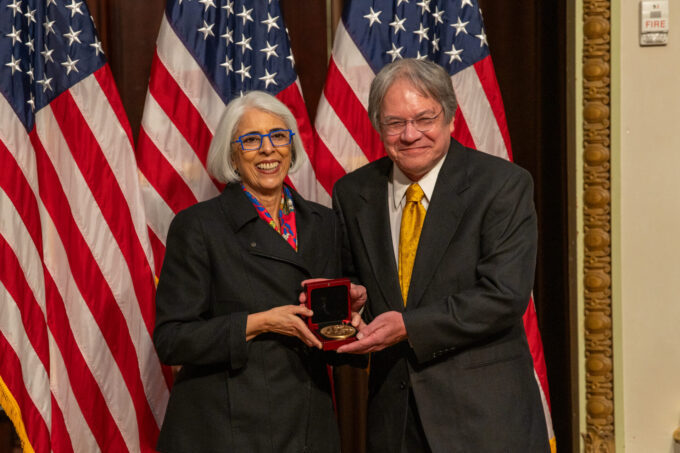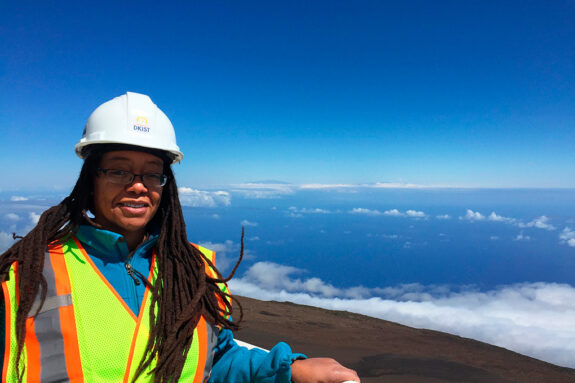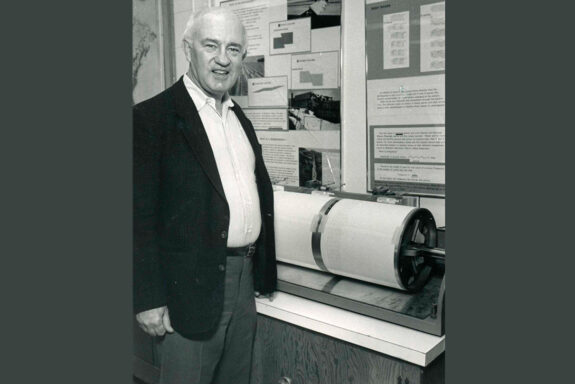EAPS Alumnus R. Lawrence Edwards ’76 awarded National Medal of Science for climate insights

Arati Prabhakar, PhD, Director of the White House Office of Science and Technology Policy (OSTP), awards R. Lawrence Edwards the National Medal of Science during an awards ceremony at the Eisenhower Executive Office Building in Washington, DC, January 3, 2025. Photo by Ryan K. Morris
On January 3, 2025, the Biden White House presented 23 individuals and 2 organizations with the National Medals of Science and National Medals of Technology and Innovation, including four MIT faculty and two alumni.
Richard Lawrence Edwards ’76, the Regents and Distinguished McKnight University Professor in the College of Science and Engineering at the University of Minnesota, was recognized in the citation:
For breakthrough discoveries in geochemistry that have transformed our understanding of Earth’s climate history. Lawrence Edwards’s innovative research methods shed light on the rate, scale, and drivers of climate change and the impact on human civilization – defining him as one of the most celebrated earth scientists of our time.
From the National Science and Technology Medals Foundation press release page:
Larry Edwards (本思艾) is a bi-racial Asian-American geochemist who studies climate history, climate change, and geochronology. As an undergraduate at MIT, Edwards majored in Earth and Planetary Sciences and in Art and Architecture. He earned an MS at the University of Michigan and a PhD at Caltech. He has spent his whole professional career at the Department of Earth and Environmental Sciences at the University of Minnesota.
Edwards led the development and refinement of modern uranium-thorium (or 230Th) dating methods. Edwards, James Chen, and G.J. Wasserburg were the first to apply sensitive mass spectrometric techniques to the measurement of rare isotopes of uranium and thorium in natural materials. The resulting 10,000-fold increase in sensitivity led to large reductions in uncertainty in age and a doubling of the time range of 230Th dating. These techniques have re-written the timeline of the last half million years of earth history, which includes major shifts in climate, the last stage of human evolution, and historical cultural changes. Edwards andcolleagues have also used these methods to contribute to a full calibration of the radiocarbon timescale, resulting in improvement in the accuracy of radiocarbon ages in the older half of the timescale.
Along with collaborators, Edwards has pieced together records of hundreds of thousands of years of climate change from caves worldwide, including a 640,000-year history of the Asian Monsoon from caves in China. His work helps us to understand the causes of abrupt climate change, tipping points in the climate system, and rapid melting of ice sheets at the end of glacial cycles. Some of his research assesses the relationship between climate change and cultural history, drawing plausible links between shifts in rainfall and cultural changes.
Among his many honors, Edwards is a Fellow of the American Academy of Arts and Sciences, a member of the National Academy of Sciences, a Foreign Member of the Chinese Academy of Sciences, and a Benjamin Franklin Laureate.


